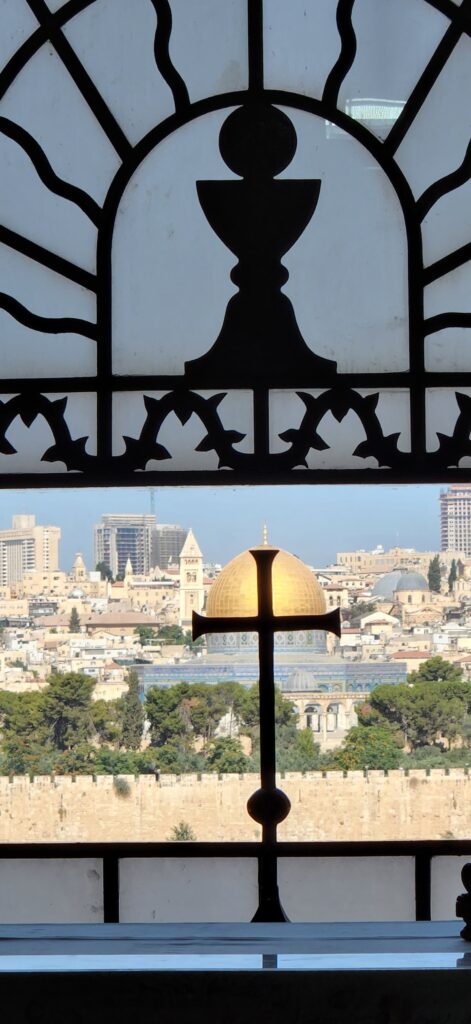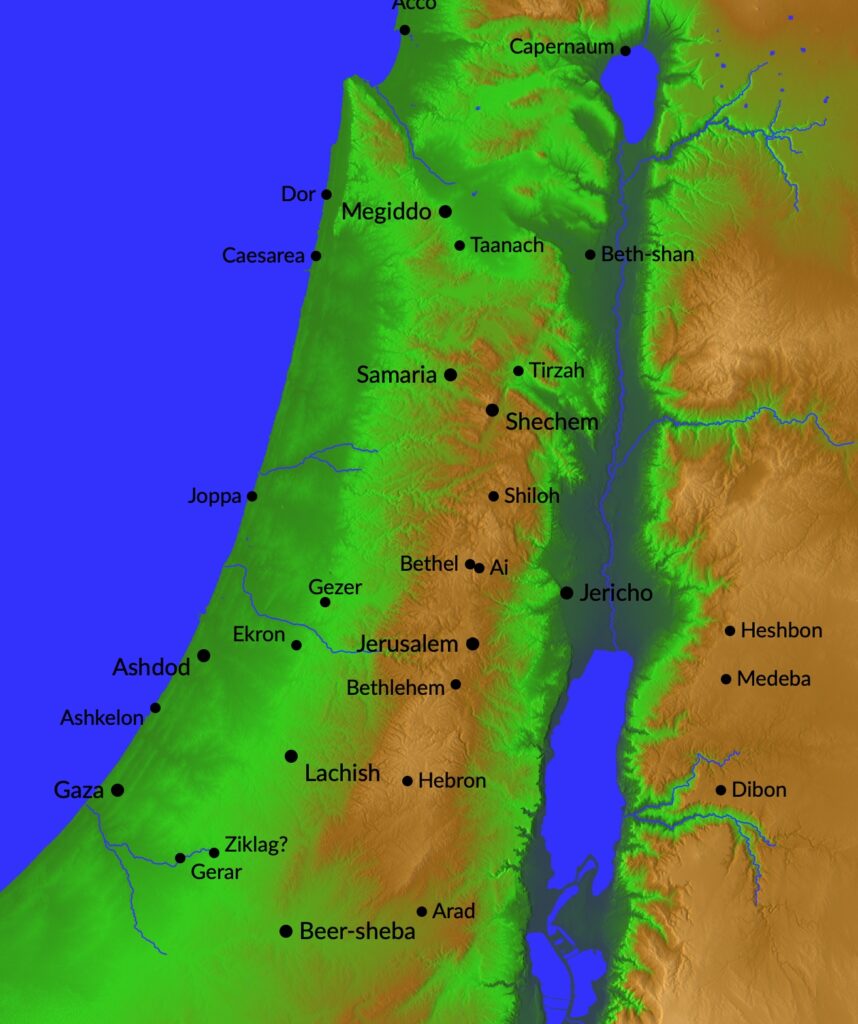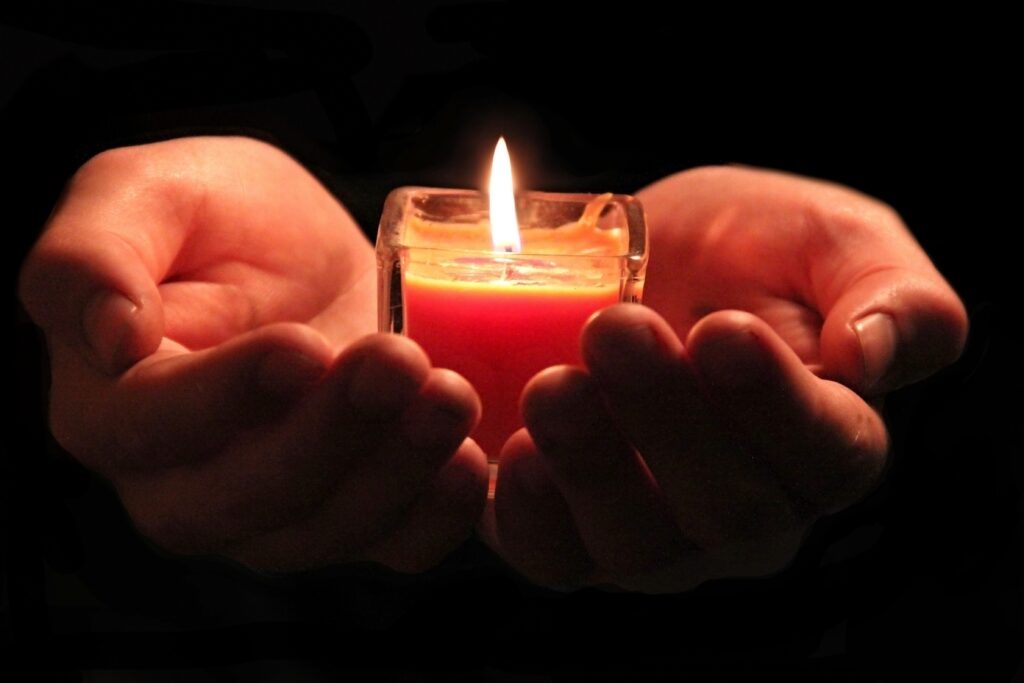
September 2022 Pastor’s Corner – Left On ‘Read’

“O LORD, rebuke me not in your anger,
nor discipline me in your wrath.Be gracious to me, O LORD, for I am languishing;
heal me, O LORD, for my bones are troubled.My soul also is greatly troubled.
But you, O LORD—how long?” (Psa. 6:1–3)
If you are looking for a way to annoy a teenager (and really, who isn’t? It’s so much fun!), one of the best ways is to read a text they send you and not respond to it. This might be a trick that only works on iPhones, but here’s the basic idea. iPhones can send a status update for texts sent to other iPhones, letting the sender know when the message was delivered and read (you can see an example in the picture, look below the text bubble that says “on”). It absolutely drives my daughter crazy when I read her text messages and don’t reply promptly. It upsets her because she knows I’ve received her message, and I’ve even read it, but I haven’t yet answered her. The first time she called me out on it, she exclaimed, “Dad, you left me on ‘read’!” I had no idea what she meant until she explained it to me. While that time was accidental, I now do it all the time, just to annoy her.
The thing is, though, I always respond to her messages, but I don’t always do so via text. I might wait until the next time I see her. I might choose to respond with actions instead of words. I might respond to the text message with an email or a phone call. Sometimes, I’ll respond through her mother or brother. I don’t actually do this to annoy her (most of the time), but because I think those might be better or more efficient ways to respond in the moment.
This has been on my mind lately, because I think there are a lot of times when it feels like God has left us on ‘read.’ We pray, but we don’t hear an answer… or maybe the better way to say it is that we don’t receive an answer from Him in the way we would prefer. If my daughter texts me, she would like a text message back. Promptly. Sometimes, God answers our prayers in very different ways from what we might prefer or desire. Sometimes, He answers our prayers weeks, months, sometimes even years after we lift them up to Him. We know God hears our prayers, the Psalms remind us of that all the time (see Psalm 3:4, 4:3 17:6, 55:17, and 116:1), but it seems like God leaves us on ‘read’ when He doesn’t answer our prayers when or how we would like.
But God does, in fact, always hear our prayers. And He always answers them. Our task is to trust in Him and wait patiently for His answer. His timing is always perfect, and His methods are precisely what we need. The question is, when God seemingly leaves us on ‘read,’ will we continue to trust in Him?
I waited patiently for the LORD; he inclined to me and heard my cry. He drew me up from the pit of destruction, out of the miry bog, and set my feet upon a rock, making my steps secure. He put a new song in my mouth, a song of praise to our God. Many will see and fear, and put their trust in the LORD. — Psalm 40:1–3
Blessings,
Rev. David Garrison
Read more...

August 2022 Pastor’s Corner – The Fifth Gospel

And when he drew near and saw the city, he wept over it, saying, “Would that you, even you, had known on this day the things that make for peace! But now they are hidden from your eyes. For the days will come upon you, when your enemies will set up a barricade around you and surround you and hem you in on every side and tear you down to the ground, you and your children within you. And they will not leave one stone upon another in you, because you did not know the time of your visitation.” (Luke 19:41-44)
This picture is taken from inside the chapel of the Dominus Flevit (Latin for “The Lord wept”). According to Luke, as Jesus came over the Mount of Olives on Palm Sunday and saw the city of Jerusalem and the Temple Mount before him, he wept over it. The chapel is in the shape of a teardrop, and is one of the only catholic chapels to be oriented west-east (most are east-west). It’s amazing how well the architecture of the place carries the emotive weight of the location.
If anything becomes clear when visiting the Holy Land, it’s how precious this particular place is to the Lord. While “the earth is the Lord’s, and everything in it” (Psalm 24:1), God has chosen this particular portion of land on the shores of the eastern Mediterranean Sea and made it holy unto Him, and given it to the people He has chosen for Himself. We know that God has worked purposefully and intentionally throughout history, but you see that when you visit these incredible places we’ve read so much about in our Bibles. Faith comes alive in a visceral way.
As I mentioned in my sermon on July 17 after I returned, “What becomes abundantly clear as you tour the Promised Land is how much the land itself proclaims the Gospel of Jesus Christ, hence why it has earned the name, ‘The Fifth Gospel.’” As another pastor friend of mine has said, after visiting the Holy Land, you’ll never read your Bible the same again. It really is as transformative an experience as they say.
I hope to pass along as much of my experiences and the things I learned in the weeks and months to come, but mostly I want to encourage you to make plans to visit the Holy Land at least once in your life. My friend, Cameron Smith (who took that picture) is planning a trip for February, and I’m working on putting one together for next July. I promise you, it’s worth every penny it costs to go. This land has a special place in God’s heart, and it should in ours as well, even as we wait eagerly for the new heavens and new earth to come down with Christ when He returns.
Then I saw a new heaven and a new earth, for the first heaven and the first earth had passed away, and the sea was no more. And I saw the holy city, new Jerusalem, coming down out of heaven from God, prepared as a bride adorned for her husband. And I heard a loud voice from the throne saying, “Behold, the dwelling place of God is with man. He will dwell with them, and they will be his people, and God himself will be with them as their God. He will wipe away every tear from their eyes, and death shall be no more, neither shall there be mourning, nor crying, nor pain anymore, for the former things have passed away.” (Rev. 21:1–4)
Blessings,
Rev. David Garrison
Read more...

July 2022 Pastor’s Corner – Pilgrimage

For the LORD has chosen Zion;
he has desired it for his dwelling place:
“This is my resting place forever;
here I will dwell, for I have desired it.”
— Psalm 132:13–14
For Christ has entered, not into holy places made with hands, which are copies of the true things, but into heaven itself, now to appear in the presence of God on our behalf. Nor was it to offer himself repeatedly, as the high priest enters the holy places every year with blood not his own, for then he would have had to suffer repeatedly since the foundation of the world. But as it is, he has appeared once for all at the end of the ages to put away sin by the sacrifice of himself. (Heb. 9:24–26)
Rev. David Garrison
Read more...

June 2022 Pastor’s Corner – Change

“In this world nothing can be said to be certain, except death and taxes.” — Ben Franklin
“Jesus Christ is the same yesterday and today and forever.” — Hebrews 13:8
The past several years has taught us how quickly things can change, and change drastically. Some of these changes have been good, many of them have been difficult, if not very hard. Just about every area of our lives has been shaken and challenged. Most of these changes have been as unexpected as they were unprecedented; some of them we could see coming.
I’ve been reflecting on change a lot lately. Part of that has been stirred by the cultural changes we’re seeing around us, but closer to home it’s been triggered by my son’s graduation from high school and preparation for college. Our family is moving into a season of change we’ve not experienced since my son was born. Many of you have experienced that transition yourselves, some of you have a few more years. When facing changes like these, it’s easy to begin to feel “unmoored.” But, as my (great x6) uncle Ben Franklin said above, everything changes, except death and taxes.
There’s a lot of wisdom and a lot of truth in my uncle’s observation…but he missed something crucial. As the author of Hebrews reminds us, Jesus Christ never changes either. As part of the Holy Trinity, God the Son has always existed. God the Son is as much the same before the incarnation as after it, as before his death and resurrection as after it, as before his ascension into heaven as after it, as before his ultimate return as after it. His nature, his mission, his work, his hesed (steadfast lovingkindness — see the sermons on Ruth) is all exactly the same yesterday, today and forever.
We depend on consistency and stability to keep us anchored in our lives. But if we anchor ourselves to something that will move or change, we can’t rely on that mooring. Everything moves and changes — relationships, jobs, people, family, the stock market, politics, the weather, even church. The only true certainty in life is Jesus Christ. When we anchor ourselves to Christ, we can weather whatever storm may whip up around us, whatever change and transition might come our way. How do we anchor ourselves to Jesus Christ? He tells us that himself:
“Everyone then who hears these words of mine and does them will be like a wise man who built his house on the rock. And the rain fell, and the floods came, and the winds blew and beat on that house, but it did not fall, because it had been founded on the rock.” (Matt. 7:24–25)
Knowing the Word of God through Christ in Scripture and doing what He says is how we secure ourselves to Jesus Christ. We “hear these words” of His by spending time reading the Bible and in prayer every day, by going to Sunday school and Bible studies each week, and by worshipping with the body of Christ each Sunday morning. We “do what it says” when we put what we hear into practice each and every day.
If there is any particular way we can help you work through the changes and challenges you are navigating by helping you hear His word and doing it, please don’t hesitate to reach out and let us know.
Blessings,
Rev. David Garrison
Read more...

May 2022 Pastor’s Corner – Irritating

“So I find it to be a law that when I want to do right, evil lies close at hand. For I delight in the law of God, in my inner being, but I see in my members another law waging war against the law of my mind and making me captive to the law of sin that dwells in my members. Wretched man that I am! Who will deliver me from this body of death?” (Rom. 7:21–24)
We are deep in the throes of pollen season. You can’t really miss it, since we’re all driving greenish-yellow cars right now. It is arguably the most singularly irritating season of the entire year. If you suffer from allergies, it’s torture. If you don’t, it’s irritating. The pollen gets everywhere and covers everything. Occasionally you can even see clouds of the stuff blowing out of the trees, but even when you can’t, you can taste it every time you step outside. Constant sneezing, runny noses, and itchy eyes are part and parcel these days. Considering how small pollen particles are, it’s pretty impressive how much trouble they cause.
The only relief we can look forward to is the next rain shower. For a brief moment, perhaps a few hours or even a day if we’re lucky, the rain will wash the pollen away. Our cars return to their usual colors, our decks and homes are washed clean, and the air doesn’t attack our nasal passages. For a little while, at least. Of course, that very rain triggers even more pollen to come, but I’m working on an analogy here so let’s not push things farther than they’re meant to go.
We focus a lot of our time and energy on avoiding the “big” sins (such as sexual immorality, rage, jealousy, envy, drunkenness and the others listed in Galatians 5:19-21), which we should. But sometimes I think we forget about the “small” sins, or we think they’re not that big of a deal. As long as we’re not “too bad” then we should be ok, right? However, kind of like pollen, those small sins can become big irritants. If we don’t attend to the small sins in addition to the big ones, they can irritate our faith and our walk with the Lord. The simple truth is that sin is sin, regardless of its size.
Just like we yearn for rain to wash the pollen away, we can rest assured that, through the sacrifice and resurrection of Jesus Christ, we can “draw near with a true heart in full assurance of faith, with our hearts sprinkled clean from an evil conscience and our bodies washed with pure water.” (Heb. 10:22) Jesus didn’t just cleanse us of the “big” sins, but the “small” ones too. The pure water of the Holy Spirit and the Word of God wash us clean. May we take all of our sins to the cleansing waters of the Holy Spirit so that we can be refreshed, renewed and restored.
“Christ loved the church and gave himself up for her, that he might sanctify her, having cleansed her by the washing of water with the word, so that he might present the church to himself in splendor, without spot or wrinkle or any such thing, that she might be holy and without blemish.” (Eph. 5:25–27)
Read more...

March 2022 Pastor’s Corner – Trust & Hope

1Yahweh, my heart is not haughty, I do not set my sights too high. I have taken no part in great affairs, in wonders beyond my scope. 2 No, I hold myself in quiet and silence, like a little child in its mother’s arms, like a little child, so I keep myself. 3 Let Israel hope in Yahweh henceforth and for ever. (Psalm 131, New Jerusalem Bible)
Every once in a while you happen across a passage of scripture that catches you off guard. At first, you think, “that’s a nice Psalm.” But then you keep thinking about it. A few hours later, it becomes, “man, I can’t get that Psalm out of my mind.” As the hours turn to days, you start to think, “Yeah, there’s something going on here. Why is this Psalm continuing to rattle around in my head?” If you haven’t already, this is the point when our thinking should turn into praying. We ask the Holy Spirit to open our eyes and soften our hearts in order to hear what He is trying to tell us.
That’s what happened to me just a few weeks ago. I came across this Psalm in preparation for last month’s Session meeting. It made a very nice opening devotion for our meeting. But then I couldn’t stop thinking about the Psalm. I love the imagery it uses — the idea of resting contentedly in God’s arms the way a little child rests in his mother’s arms speaks to the deep longing of my soul. But that’s not the part that stuck with me. It was the first verse that wouldn’t leave me alone. The hard truth of the matter that I’d prefer not to admit is that my heart is inclined toward haughtiness. I do tend to set my sights too high. I am prone to thinking that I’m the one who has to solve all of life’s problems, in great affairs and wonders beyond my scope. It’s not that I’m terribly arrogant or boastful, rather more that I often think it’s my responsibility to figure everything out and know what the right course or solution should be. I am often discontent with my lot, and think it’s up to me to change it.
But that isn’t what God wants from me, or from us. Rather, we’re invited and encouraged to be still and quiet, to rest contentedly in His arms. That’s the image of verse 2. A child, whose every need has been met and trusts fully in her mother, peacefully at sleep, without a fear or worry. That is the kind of relationship God yearns to have with us. God yearns to provide for our every need, to keep us safe and secure, to hold us warmly and tenderly so we can rest in Him without fear or worry. What keeps us from experiencing that kind of love is our discontent, our constant striving for more… in other words, the haughtiness of our hearts and the setting of our sights too high.
The Holy Spirit is still convicting me through this Psalm. My soul yearns for this peace and rest, but my heart resists. I find myself praying through this Psalm and also Paul’s words in Romans 7: “I do not understand my own behaviour; I do not act as I mean to, but I do things that I hate.” (Rom. 7:15) Maybe that’s something you find happening in your heart and soul as well. That’s ok, it’s part of the journey. As soon as we learn to trust God a little bit, He invites us to take the next step and trust Him even more deeply. To steadily and steadfastly rest in Him more and more; to become progressively more content with His provision. It’s easier said than done, but the rewards are well worth it.
Not that I am speaking of being in need, for I have learned in whatever situation I am to be content. I know how to be brought low, and I know how to abound. In any and every circumstance, I have learned the secret of facing plenty and hunger, abundance and need. I can do all things through him who strengthens me. (Phil. 4:11–13)
Blessings,
Rev. David Garrison
Read more...

February 2022 Pastor’s Corner – The Light Shines

“The true light, which gives light to everyone, was coming into the world. He was in the world, and the world was made through him, yet the world did not know him. He came to his own, and his own people did not receive him. But to all who did receive him, who believed in his name, he gave the right to become children of God, who were born, not of blood nor of the will of the flesh nor of the will of man, but of God.” (John 1:9–13)
“For what we proclaim is not ourselves, but Jesus Christ as Lord, with ourselves as your servants for Jesus’ sake. For God, who said, “Let light shine out of darkness,” has shone in our hearts to give the light of the knowledge of the glory of God in the face of Jesus Christ.” (2 Cor. 4:5–6)
Rev. David Garrison
Read more...

A Table Laid for the Grinch – By Christy Sechler

Let us rejoice and exult and give Him the glory, for the marriage of the Lamb has come…And the angel said to me, “Write this: Blessed are those who are invited to the marriage supper of the Lamb.” ~ Revelation 19:7 & 9
When the movie was over, I couldn’t help thinking about the truth behind the story, because as much as I’d like to think of myself as one of those well-meaning and resilient Whos, I know that I’m actually the Grinch. In fact, we all are. We’re all born, not just with a heart “two sizes too small” but with a heart that has been corrupted and corroded by sin. With hearts like that, we are more than happy to spend our days working hard to take happiness away from others if that will make us feel good. We think that we deserve to be happy, and if life won’t give us that happiness we must take it for ourselves. Like the Grinch, we think all of our efforts will give us the joy we want. And like the Grinch we find ourselves severely disappointed. That, of course, is the blessed news of Christmas—Jesus came for grinches; He came for sinners. God the Father knew that we could never find true happiness or love apart from Him. He knew we would be forever separated from all that is good and beautiful and our too-small hearts needed to be reborn. And so He sent Jesus, to live in a world full of grinches, to die on the cross for sinners.
Read more...

December 2021 Pastor’s Corner – Heavy Holidays

The disappointment, brokenness, suffering, and pain that characterize life in this present world is held in dynamic tension with the promise of future glory that is yet to come. In that Advent tension, the church lives its life. — Fleming Rutledge, Advent (pp. 7-8).
“Then I saw a new heaven and a new earth, for the first heaven and the first earth had passed away, and the sea was no more. And I saw the holy city, new Jerusalem, coming down out of heaven from God, prepared as a bride adorned for her husband. And I heard a loud voice from the throne saying, ‘Behold, the dwelling place of God is with man. He will dwell with them, and they will be his people, and God himself will be with them as their God. He will wipe away every tear from their eyes, and death shall be no more, neither shall there be mourning, nor crying, nor pain anymore, for the former things have passed away.’” (Rev. 21:1–4)
Rev.David Garrison
Read more...

November 2021 Pastor’s Corner – Dancing With The Devil

Tell me something, my friend. You ever dance with the devil in the pale moonlight? — The JokerDon’t… tempt me Frodo! I dare not take it. Not even to keep it safe. Understand, Frodo. I would use this ring from a desire to do good… But through me, it would wield a power too great and terrible to imagine. — Gandalf
Be sober-minded; be watchful. Your adversary the devil prowls around like a roaring lion, seeking someone to devour. Resist him, firm in your faith, knowing that the same kinds of suffering are being experienced by your brotherhood throughout the world. — 1 Peter 5:8–9)
Rev. David Garrison
Read more...
